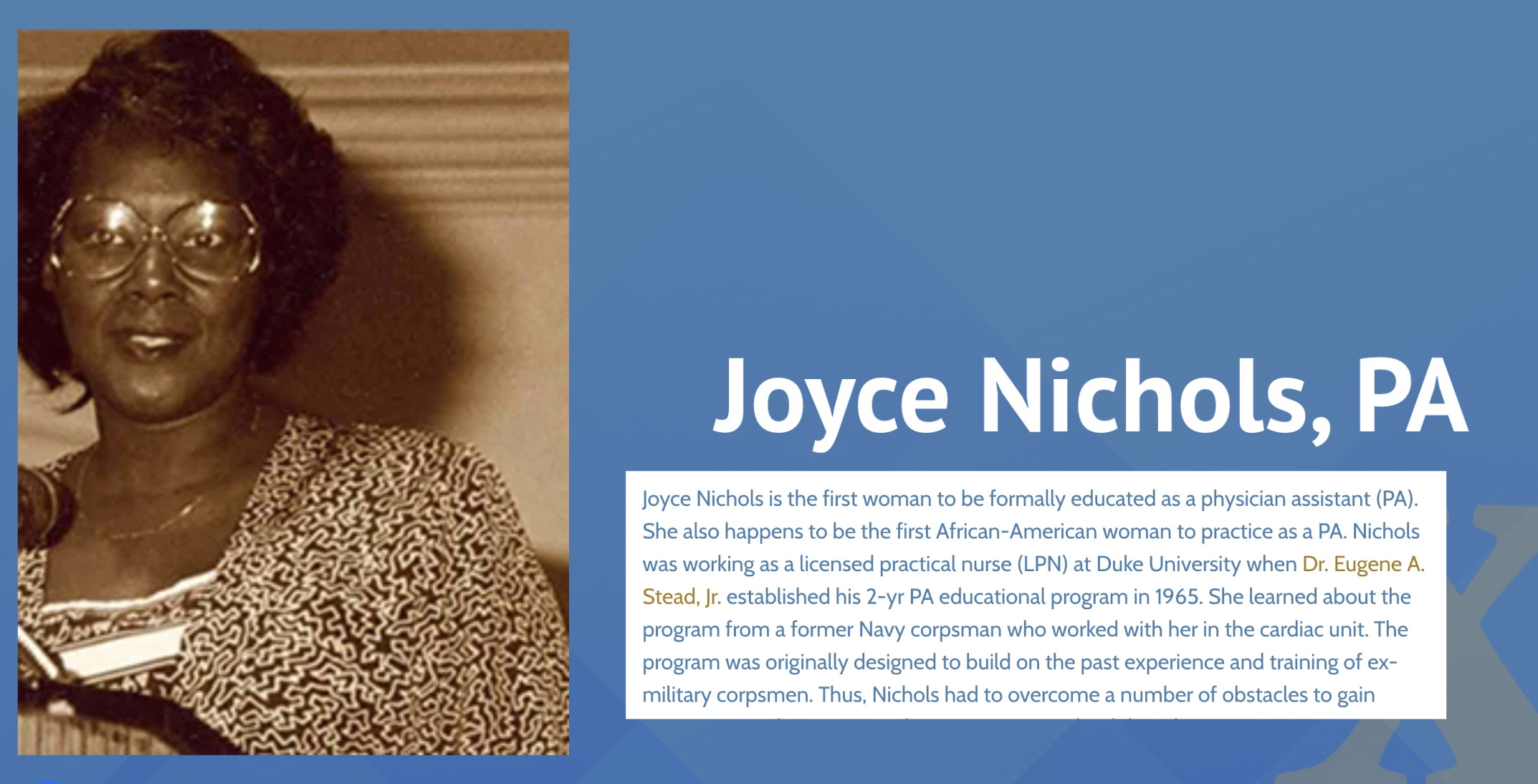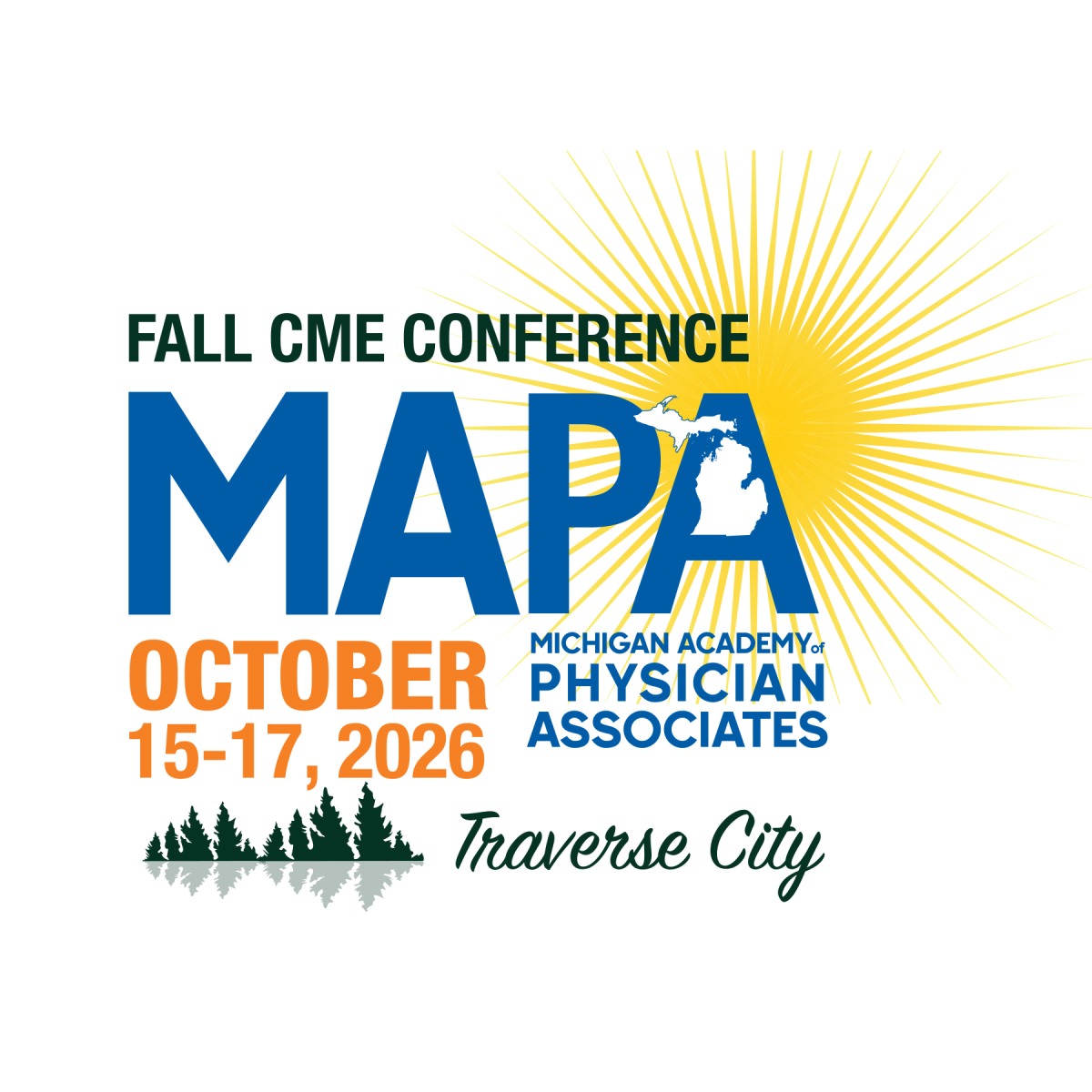The History of MAPA
The idea of MAPA began in 1974 and became official in 1975.
MAPA Milestones
2023: MAPA changes its name to the Michigan Academy of Physician Associates.
2020-2021: Michigan Governor signs Executive Order waiving onerous practice requirements for PAs during a declared public health emergency or disaster.
2017-2018: MAPA receives AAPA award for Constituent Organization Outreach and Advocacy Award of PA 379.
2016-2017: PA 379 Summary - PAs will work within a Practice Agreement with a participating physician; The terms "supervision" and "delegation" were removed in law in favor of a practice agreement with a physician; Removes arbitrary PA/physician ratios in the statute; PAs are now fully independent prescribers; PAs will continue to practice with a participating physician as a member of a practice team.
2012-2013: Michigan Medicaid requires PAs enroll in CHAMPS. This mandate allows PAs to continue to provide services to Medicaid patients and bill for services rendered under the PA's NPI and the practice in which they work and will be reimbursed at 100% of the Medicaid physician fee schedule.
2011-2012: Public Act 210 of 2011 - PAs may round on patients; ability for PAs to prescribe Schedule II drugs; PA can sign forms that call for a physician's signature; order restraints; PA & physician name on prescription labels written by the PA.
2010-2011:
- July 19, 2010 Public Acts 124, 125 & 126 add PAs to list of professionals able to form professional corporations (PC) and professional limited liability corporations (PLLC), and clarifies that physicians and PAs can enter into theses businesses.
- September 2010, MAPA, MSMS and MOA leadership meets to form a joint taskforce to address the future of healthcare in Michigan forming a consensus statement emphasizing the PA/Physician Team as central to mutual success.
- SB 384 is passed by the Senate and is awaiting House review. The bill addresses access to care issues such as delegation of hospital rounds, prescriptive restrictions, and limitations on signatures on forms that only list the physician.
2007-2008: After 15 years of work, MAPA finally overturns BCBSM refusal to pay for Surgical PA first assist.
2006-2007: Public Acts 41, 48, 49, 50 and 51
2005-2006: Public Act 281 allows PAs to refer to physical therapists.
2004-2005: Public Acts 19, 133, 144, 152, 187 and 512
2002-2003:
- Public Acts 543 - Good Samaritan; 618 - Allows for Bus Driver physicals; 647 - Allows PAs to write for handicap parking permits
- Differences between the State of Michigan and the DEA create uncertainty for PA’s writing controlled substance prescriptions. After 2 years of discussions, the issue was resolved.
1999-2000:
- MAPA creates a list of ‘Barriers to PA Practice.’ A plan was created to overturn all of the antiquated laws disallowing PAs to practice in aspects of care or allowing negative interpretation by administrators of health plans and State agencies.
- After over 10 years of work, MAPA finally changes the BCBSM office supervision requirements for PAs.
- Legislation passes allowing Physicians to delegate the ability to prescribe controlled substance medications to PAs and NPs.
1998-1999: Due to the difficulty in getting laws passed, MAPA uses membership dues to hire a lobbyist/executive director dedicated to improving the practice environment for Michigan PAs.
1995-1996: MAPA hires a lobbyist to help pass Sampling Bill. MNA amendments cause MAPA to kill the bill. Issue is reintroduced and passes at a later date.
1994-1995: Multiple attempts at public hearings on controlled substance rule change fail due to opposition of organized medicine.
1980-1981: Extremely restrictive PA practice rules are defeated by grassroots lobbying in hearings with the Joint Committee on Administrative Rules.
1976-1977: PA Enabling Legislation passed in Michigan. PAs were invited to Governor Milliken's Office to witness the signing.
1975: MAPA files Articles of Incorporation with Michigan Department of Commerce's Corporation and Securities Bureau.
1974:
- November - AAPA signs Articles of Incorporation as a nonprofit organization.
- October - Michigan Academy of Physician Assistants is formed by Bill Klerk, Dick Lane, Jack Kircher, Greg Terpstra and Mike Davis in Kalamazoo, MI.
- August - The 1st class of PAs in Michigan graduate from Mercy College of Detroit (now known as University of Detroit-Mercy) and Western Michigan University.
1973: The Commission on Physician Assistants is formed.
Our Story
In August 1974, Western Michigan University and Mercy College of Detroit (now known as University of Detroit-Mercy) graduated the first class of PA's in Michigan. In October 1974 many of the new graduates were informed that Michigan was about pass unfavorable legislation regarding PA's. This prompted the group to contact the AAPA. They were advised to form an affiliate chapter as soon as possible. Bill Klerk, Dick Lane, Jack Kircher, Greg Terpstra, and Mike Davis formed the Michigan Academy of Physician Assistants in Kalamazoo, MI. In November 1974, Articles of Incorporation were signed for AAPA as a nonprofit organization.
In 1976 Michigan’s first PA Legislation was enacted all PA’s in Michigan were invited to Governor Milliken's Office to witness the signing ceremony. The first female president was Judy Willis in 1980. MAPA has come a long way since our origin in 1974. We are currently under the leadership of our 36th president.
The history of the Michigan Academy of Physician Assistants has been documented in a video presentation: “A Struggle to Grow: The Early Years of the Michigan Academy of Physician Assistants.” Many of the people listed in the timeline below were interviewed regarding their memories of the early struggles to gain the legal authority to practice medicine and acceptance by the medical community as legitimate partners in providing competent high-quality care for Michigan’s citizens.
In 2024, MAPA officially changed its name to the Michigan Academy of Physician Associates.
Mission
The Michigan Academy of Physician Associates is the essential resource for the PA profession in Michigan and the primary advocate for PAs in the state.
Vision
The Michigan Academy of Physician Associates is committed to providing quality, cost-effective, and accessible health care through the promotion of professional growth and enhancement of the PA practice environment.
Values
Physician Associates
- Are advocates of accessible and compassionate health care
- Promote improved health in our communities through a team-based approach
- Have a commitment to lifelong personal and professional learning.
- Adhere to the AAPA Code of Ethical Conduct
- Promote the acceptance and utilization of PAs
Instill the values of accountability and transparency in the work environment - Promote excellence and equity in the delivery of cost-effective quality health care
- Foster mutual support and inclusion of all PAs


